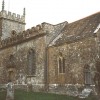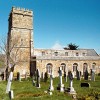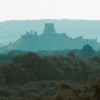Lord Mayor of London?
Promotion to the nobility came late in life for William Martyn, which is not to belittle his achievements earlier in life. He was actively engaged in administration for the government at a local level; he was at various times a Commissioner for the Peace, his name appears as a witness on many local documents and in 1492 a William Martyn was the Steward of Dorchester. He was Collector of Customs and Subsidies in Poole in 1473 and 1476, a position his father had held in 1449 and later his son and heir, Christopher, in 1499. A licence to import wine was granted to him in 1486, suggesting he was a merchant as well as being a member of the landed gentry and a sheep farmer.
He was born in 1446 and inherited the manor of Athelhampton and estates in Somerset at the death of his father, Thomas Martyn, on the 14th of September 1485. The standing of the Martyn family in Dorset was on a par to that of the Trenchards and Strangeways; in short William Martyn was a figure of importance in Dorset society of the day. We think it unlikely this busy member of the Dorset gentry could have found time in 1492/3 to hold and fulfil the duties of the office of the Lord Mayor of London, a role credited to him by most commentators from the usually reliable Royal Commission on Historical Monuments to the less reliable Wikipedia and most in between.
The Evidence
A trustworthy source nearer to the events of those days, Hutchins, makes no mention of Sir William Martyn holding the position of Lord Mayor of London – neither does an earlier source, Coker’s Survey of Dorset.
In 1495 a Licence was issued by Henry VII: “To William Martyn, gentleman, and his heirs, to enclose and fortify their manor at Alampston, co. Dorset, with walls of stone and lime, and to build towers within the said manor and crenellate the same and to impark and inclose with pales 100 acres of their lands called ‘Adlampson Parc’ and 60 acres called ‘le Est’ and le Mydell Closes’ belonging to the said manor and make a park thereof so than none shall enter the said park or warren to course or take anything which belongs to park or warren under a forfeiture of 101”.
Hutchins says the father of William Martyn of Athelhampton was called Thomas; elsewhere it is stated that William Martyn, Lord Mayor of London, was the son of Walter Martyn of Hertford. Furthermore, the Chronicles of London report that William Martyn, Alderman, was knighted in 1494, but in the licence granted to William Martyn of Athelhampton in 1495 and mentioned above he is referred to as a gentleman and this continues to be the case until 1501.
We might also question why separate general pardons were granted for offences prior to March 1502: one to William Martyn of Athelhampton, co. Dorset, knight and another to William Martyn, knight and alderman, a citizen of London. Another pardon roll refers to one Richard Martyn, gentleman, skinner or merchant of the staple as being “son and heir of William Martyn knight, late alderman of London.” The heir to Sir William Martyn of Athelhampton was named Christopher; William’s second son was named Richard and is later referred to as Richard Martyn of Exeter, not London.
Then there is the matter of the Wills. Sir William Martyn of Athelhampton died in 1504. According to The Chronicles of London Sir William Martyn, described as a “skinner and late mayor”, died in October 1505. In the Will of Sir William Martyn of Athelhampton many Dorset place names are mentioned but there is no reference at all to London. In “The Index of Wills Proved in the Prerogative Court of Canterbury” a will was proved in 1504 of a Sir William Martyn of Puddletown, Dorset. A further will was proved in 1505, that of Sir William Martyn of St. Christopher’s, London.
Conclusion
All the evidence points to there being two men who shared the same name, rank and importance within their own communities yet certainly nothing we have found detracts from the status and respect afforded of Sir William Martyn of Athelhampton.



